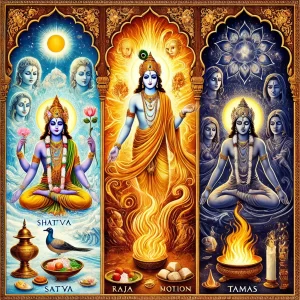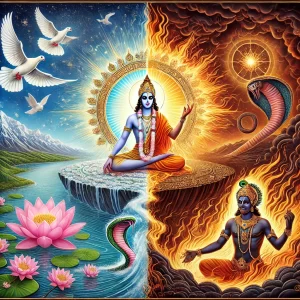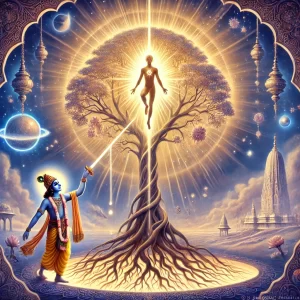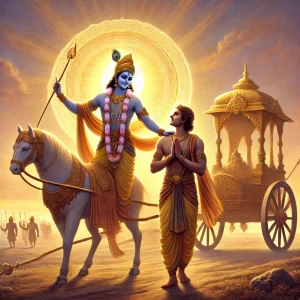
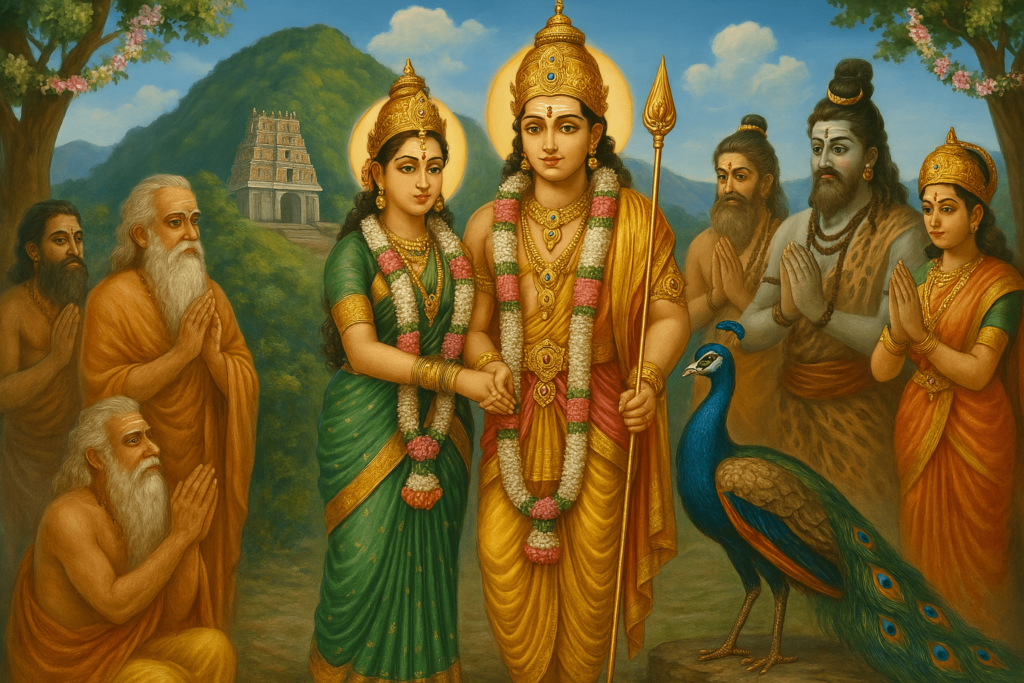
In the boundless heavens, where stars gleamed like jewels and the air was filled with the music of creation, a shadow had begun to grow. The mighty demon Surapadman, once a devotee of the gods, had turned his gaze to conquest. Empowered by powerful boons and his own unrelenting pride, he declared himself the ruler of all three worlds.
The devas—once proud and radiant—were now subdued, hiding in fear, their sacred rites disrupted, their voices drowned in the roars of Surapadman’s tyranny. The balance of the cosmos was faltering.
And so, they turned to the source of transformation—Lord Shiva, the destroyer of illusion, and the fire of divine will. Moved by the cries of the devas, Shiva opened his third eye, and from its blazing center, he released six sparks of celestial fire—each one more radiant than the sun itself.
The six sparks were carried by Agni (the fire god) and Vayu (the wind god) to the sacred Saravana Poigai, a pond nestled within a forest of reeds. There, nurtured by the six celestial maidens known as the Karthigai Pengal, the sparks took form as six divine infants. When Goddess Parvati beheld them, her maternal heart overflowed with love. She gathered them into one being—a radiant child with six faces and twelve arms—each face representing one of the cardinal directions, each arm holding divine weapons.
Thus was born Murugan, also known as Shanmuga, Skanda, and Kartikeya—the warrior son of Shiva and Parvati, born not just to protect the world, but to awaken divine knowledge and purpose.
As he grew, Murugan’s strength and wisdom shone like the midday sun. When he learned of Surapadman’s reign of terror, he did not wait for summons. He accepted the divine spear—Vel, the embodiment of Shakti and righteousness—from his mother and prepared to lead the celestial army into war.
With his peacock as his mount, and the devas at his side, Murugan descended to earth. The battle was fought over six days, fierce and relentless, ending finally on the shores of Thiruchendur, where Murugan vanquished Surapadman with compassion. Even in victory, he did not destroy the demon’s essence—instead, he transformed Surapadman into a peacock and a rooster, who would serve as his vahana and emblem, forever reminders of redemption through grace.
When the heavens rejoiced and peace returned to the cosmos, Indra, king of the Devas, stepped forward to offer thanks—not with riches or praise, but with a gift most precious—his daughter, the graceful and radiant Deivanai.
Deivanai, also known as Devayanai, had been raised in Indra’s palace in the celestial realm. She was noble, disciplined, and deeply devoted to dharma. In Murugan, she saw not just a god, but a being of light and purpose, one who carried both the flame of courage and the stillness of wisdom.
Indra offered her hand in marriage to Murugan, who accepted—not out of obligation, but out of divine recognition. Their union was not just a wedding of beings, but of energies: the warrior and the seer, the guardian and the nurturer, power and devotion.
The chosen place for their celestial wedding was the hill temple of Thirupparamkunram, near the ancient city of Madurai. This sacred hill, covered in jasmine and sandalwood trees, had long been a dwelling place for sages and ascetics. Its caves echoed with the chants of rishis, and its pathways carried the footprints of seekers.
The wedding was unlike any ever seen before.
Gods and goddesses descended from their abodes. The Vedas themselves seemed to hum in joy. Brahma chanted mantras. Vishnu and Lakshmi blessed the couple. Shiva and Parvati, their divine parents, stood radiant with pride. Celestial musicians played veenas and mridangams, while apsaras danced gracefully under the twilight sky.
Deivanai was adorned in glowing silks, her ornaments sparkling like stars, her forehead marked with sandal paste. Murugan stood tall, his Vel in hand, eyes glowing with compassion and stillness. The divine peacock stood by his side, feathers shimmering with every hue of the heavens.
As Murugan tied the sacred thread around Deivanai’s neck, the skies lit up in golden fire. It was not just a wedding—it was a cosmic event, the union of divine principles, and a moment of immense spiritual significance.
After the wedding, Murugan and Deivanai remained at Thirupparamkunram, choosing it as the site of their eternal presence. It became the first of the Aaru Padai Veedu—the six sacred abodes of Murugan, marking not just his military victory, but the victory of love, dharma, and sacred union.
Unlike the other abodes, where Murugan is a warrior or a teacher, here he is a bridegroom—a partner, a nurturer, and a divine anchor for relationships rooted in truth and higher purpose.
Even today, Thirupparamkunram is visited by thousands who seek the blessings of love, marriage, and unity. The temple’s underground sanctum is carved into the hill itself, representing the depth and strength of divine love. Couples pray here for lasting companionship, families come to offer thanks, and seekers sit in quiet corners, feeling the presence of Murugan and Deivanai—divine love personified.
The story of Thirupparamkunram is not just a celebration of a wedding—it is a reminder that even after battles, after chaos and fire, what truly endures is love born from humility, honor, and divine recognition.

